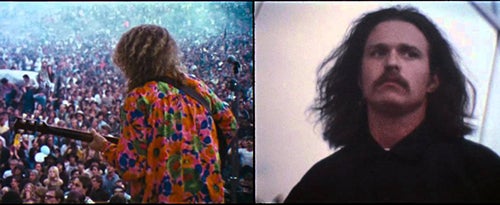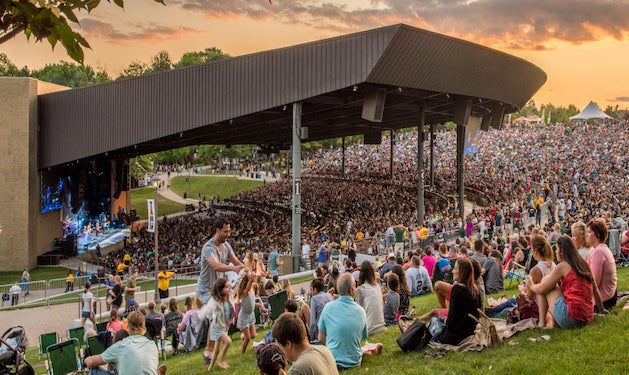Country Joe & The Fish: 50 Years of Peace & Love
The sky opened up at the end of Joe Cocker’s Woodstock performance, and the deluge that fell on the festival caused a three-hour delay. Taking the wet stage at about 6:30, Country Joe & The Fish were only the second act to perform on Sunday afternoon.
Day Three, Performer 2: Country Joe & The Fish
Performed Sunday evening, August 17, 6:30–7:50 pm

Screen grab from the movie Woodstock, showing Barry Melton (left) and Country Joe McDonald of Country Joe & the Fish performing "Rock and Soul Music."
Country Joe & The Fish Band Members
- Country Joe McDonald: guitar, vocals
- Barry "The Fish" Melton: guitar
- Mark Kapner: keyboards
- Doug Metzner: bass
- Greg "Duke" Dewey: drums
Country Joe & The Fish Woodstock Setlist
- Rock and Soul Music
- Love
- Not So Sweet Martha Lorraine
- Sing Sing Sing
- Summer Dresses
- Friend, Lover, Woman, Wife
- Silver and Gold
- Maria
- The Love Machine
- Ever Since You Told Me That You Love Me (I'm a Nut)
- Improvisation
- Rock and Soul Music (reprise)
- The "Fish" Cheer/I-Feel-Like-I'm-Fixin-To-Die Rag
Both natives of southern California, vocalist/guitarists “Country” Joe McDonald and Barry “The Fish” Melton met after both relocated to Berkeley, California in 1965. Connecting over a shared love of folk music in general and the protest music of Woody Guthrie in particular, the pair formed a folk duo, playing the local coffeehouse circuit. At the time, McDonald was the publisher of a left-wing underground newspaper called Rag Baby, and taking his cue from the anti-war protest movement, he decided to record an EP “talking issue” of the magazine. For the recordings, McDonald and Melton were joined by Carl Schrager on washboard and kazoo, Bill Steele on bass and Mike Beardslee on vocals. Talking Issue #1 was released in late 1965, with one side featuring two songs from folk musician Peter Krug and the other featuring the newly-formed Country Joe & The Fish playing two McDonald songs, an acoustic version of “I-Feel-Like-I’m-Fixin’-to-Die-Rag” and “Superbird,” a scathing sendup of president Lyndon Johnson.
After the release of the EP, the band played shows in the Bay Area, adopting a distinct psychedelic edge to their music that saw them marching in philosophical solidarity with other psychedelic groups of the era such as Jefferson Airplane and Grateful Dead. A second, self-titled EP was released in 1966, displaying this experimental/psychedelic approach and featuring a new lineup including newly-recruited members Burce Barthol (bass), guitarists Paul Armstrong and David Bennett-Cohen as well as drummer John-Francis Gunning. With McDonald taking the majority of the lead vocals, it was decided that four guitarists was a bit much so Cohen moved over to the organ.
By now the band was rapidly gaining in popularity, and folk label Vanguard Records—a company that had once turned down Bob Dylan for not being folk enough—signed the psychedelic madmen to a recording contract in December 1966. Paul Armstrong quit the group in early 1967, just prior to the recording of their first album, Electric Music For The Mind And Body. John-Francis Gunning was also ousted from the band before the sessions, replaced by Gary “Chicken” Hirsh. The band, having now evolved into their “classic” lineup, toured across the country to support the album, which was a Top 40 success in the U.S.. This was surprising, as the band’s heart-on-their-sleeve protest songs and lyrics celebrating the use of LSD and other drugs would have been a tad non-commercial for the marketplace at the time. With the album selling, the band’s underground following grew, and they made a big splash at the Monterey International Pop Festival in June 1967, a performance memorably captured in D.A. Pennebaker’s film Monterey Pop.

and Body (1967) was followed by I-Feel-Like-I'm-Fixin'-To-Die (1967),
Together (1968), and Here We Are Again (1969)
The second Country Joe & The Fish album, I-Feel-Like-I’m-Fixin’-To-Die, was released in November of 1967. While not quite as successful as their first album, it continued to show the band as one of the leaders of the psychedelic protest movement, and the band continued to tour behind it. 1968 would see the recording of the group’s third album, Together. After an argument wherein the other members of the band refused to play a political benefit at the 1968 Democratic National Convention in Chicago due to concerns about potential riots, Bruce Barthol left the group in September 1968 and the group remained without a bass player for a while. Finally, they closed the book on the “classic era” of the band with a series of performances at San Francisco’s Fillmore West in January 1969, with Jack Casady of Jefferson Airplane filling in on bass.
Hirsh and Cohen stayed with the band long enough to record their fourth album Here We Are Again in the spring of 1969 but left soon after recording was completed. The band was reconfigured with Jack Casady on bass and ex-Big Brother and The Holding company drummer David Getz. Casady’s ties to Jefferson Airplane meant that he could not be a permanent member of the band, however, and he was in turn replaced by Peter Albin, another Big Brother alumnus. During this time the band continued to tour but fell apart in the summer of 1969. When McDonald accepted the invitation for the band to play at Woodstock, a new band had to be assembled. This featured Mark Kapner on keyboards, Doug Metzner on bass, and Greg Dewey on drums. This would become the final lineup of the band.
After a stunning performance by Joe Cocker, the music was halted for over two hours while the rain passed over Yasgur’s Farm, but around 6:30 p.m. conditions were deemed safe enough to allow Country Joe & The Fish to play their set. Country Joe McDonald had been a major (and unexpected) hit on Saturday, and now he was back with his band to rock the damp Woodstock faithful. They opened with a short version of “Rock and Soul Music,” the James Brown-inspired rave-up from their 1968 album Together. Guitarist Barry Melton (aka “The Fish”) took the lead vocal over as the group segued into the bluesy “Love” from their debut album Electric Music For The Mind And Body, released in 1967.
Another song from their debut followed with the Dylan-esque “Not So Sweet Martha Lorraine” before Barry Melton stepped forward to sing a new song, “Sing Sing Sing.” which would be issued the following year on the CJ Fish album. Despite the mud bath the crowd were mired in, Country Joe then brought a bit of sun-shiny goodness out with the otherwise unreleased “Summer Dresses” before traveling down some good old country roads with a cover of Mac Davis’ “Friend, Lover, Woman, Wife,” a studio version of which would be made available on Country Joe’s first solo album Tonight I’m Singing Just For You, released the following year.
More new tunes (all to be issued on CJ Fish) kept the set going in the form of Country Joe’s “Silver and Gold” and “Maria,” and Barry Melton’s chugging “The Love Machine.” These guys were clearly all about the love. Another thing they were clearly all about was comedy, and so it was that the band got a bit silly with a cover of Tiny Tim’s “Ever Since You Told Me You Loved Me (I’m A Nut)” (an ancient Tin Pan Alley tune recorded by Mr. Tim on his 1968 album God Bless Tiny Tim). This featured keyboardist Mark Kapner playing the ukelele and singing before smashing the uke, Hendrix-style, at the end.
The group followed this with a short jam based around a Barry Melton guitar solo before moving gracefully back into “Rock and Soul Music,” this time taking the jam out to some length. This came close to falling apart when bassist Doug Metzner got completely turned around on the beat, forcing the group to fumble around for a few moments before righting the ship and bringing the main set to a powerful close. The band went into “crowd-pleasing” mode for their encore, whipping out a full-band version of “I-Feel-Like-I’m-Fixin’-To-Die Rag,” complete with “Fish Cheer” (which managed to not be a duplicate of the solo Country Joe rendition from the previous day).
Country Joe McDonald turned to solo projects after Woodstock. The other band members continued as CJ Fish but disbanded in 1979. Mark Kapner worked in Neil Diamond’s band for a time then turned to composing soundtracks for yoga and meditation tapes. Greg Dewey played on Don McLean’s Tapestry album and joined the band Grootna in 1971, later associating himself with a children’s theater in Ohio. Barry Melton played solo and as a member of The Dinosaurs. He practiced law in California and became public defender of Yolo County until he retired in 2009. He continues to perform. Country Joe McDonald continues to perform and record as a solo artist, with over 30 albums to his credit. He has performed at every Woodstock reunion concert, including several times at Bethel Woods Center for the Arts, and remains politically active, especially with Vietnam veterans’ charities.
—Wade Lawrence & Scott Parker
